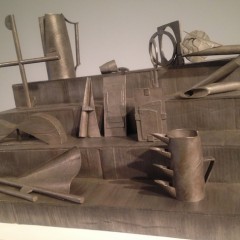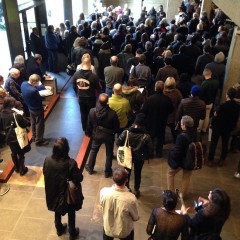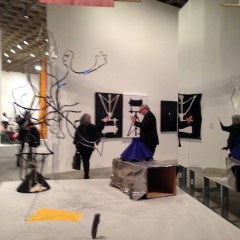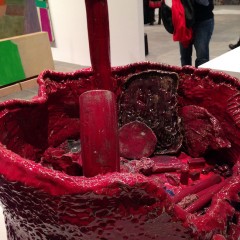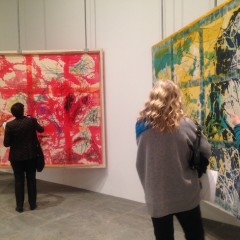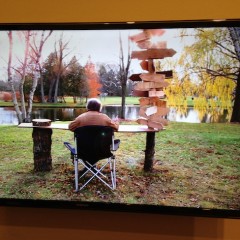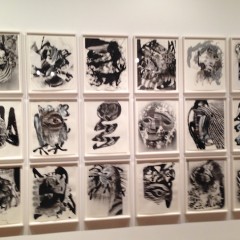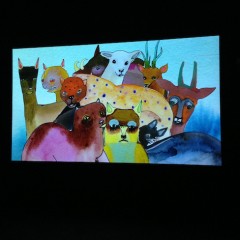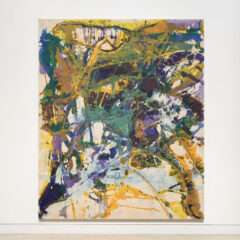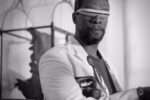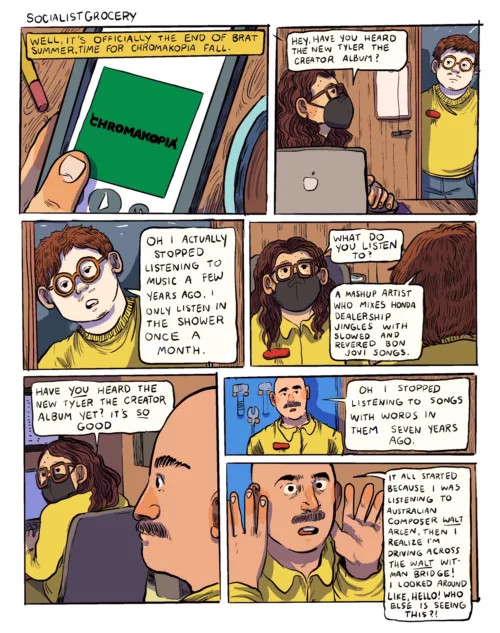Like walking through a yard sale or grandma’s attic, the hodgepodge that is the Whitney Biennial 2014 is a a little sad. All that stuff made by 103 participants, collected and sitting there, clogs the space and makes the journey through the show like walking through the Armory Show, only without the aisles and missing the weirdly high art-fair energy. Advice: Start at the top and work your way down.
Fourth Floor – Curator Michelle Grabner
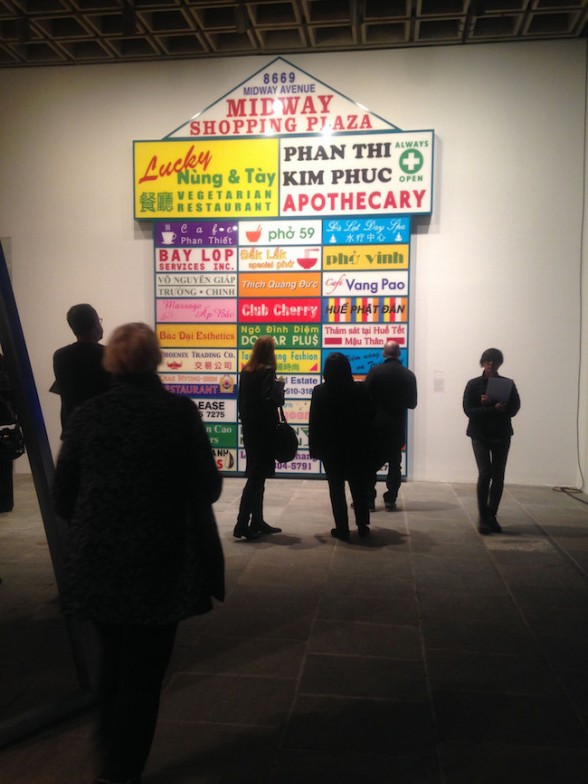
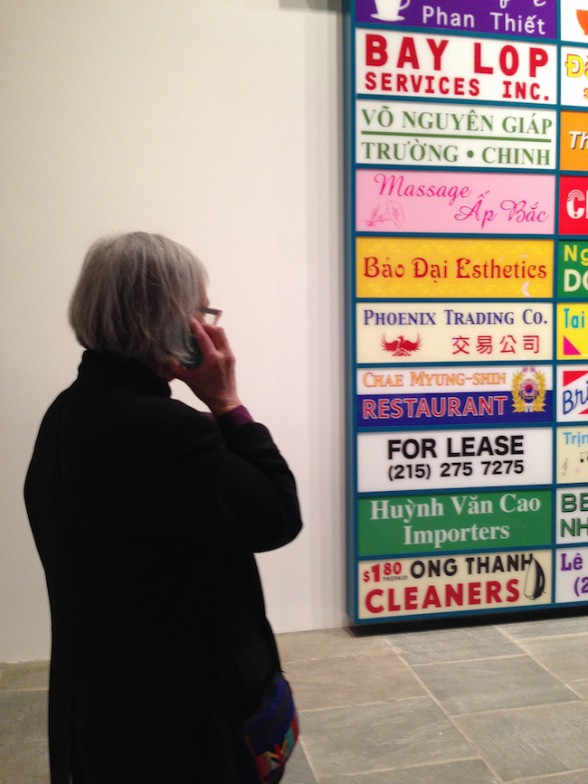
It’s shocking, we know, but like everyone, we come to the Whitney Biennial looking for our favorites and hoping to be introduced to great new artists. Happily, our favorites, Dona Nelson, Terry Adkins, Joshua Mosley and Ken Lum are standouts, and our new loves include David Robbins and Carol Jackson. Jacolby Satterwhite is formidable as well. It would be easy to dwell on the weird curating, and others have (read Jerry Saltz). For us it’s all about the work, and there are things here definitely worthy of a return trip.
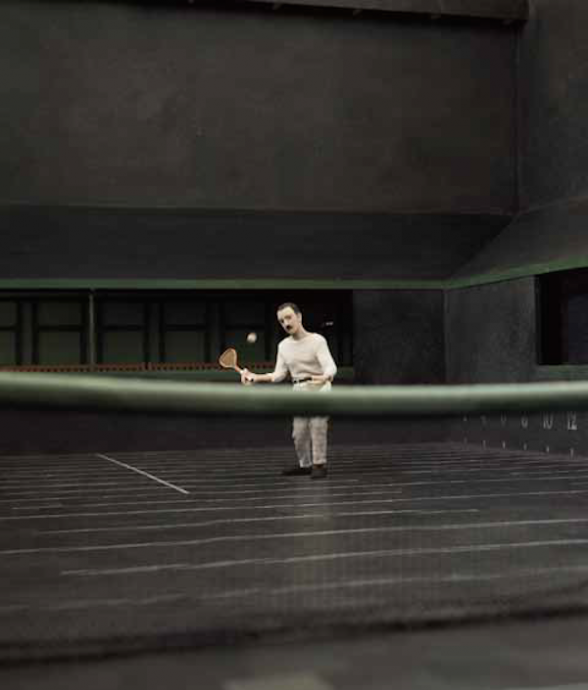
We began on a high note, with exclamations of “Ken Lum! Looks great!” then quickly got bogged down in the small galleries crowded with art. “We’ve seen things like this before,” we said, and “Why is this here, how does it relate?” (e.g., David Foster Wallace’s notebooks).
When we hit Zoe Leonard’s camera obscura, in a blissfully darkened space with only one thing in it that doesn’t take up any physical space, we were happy for the respite.
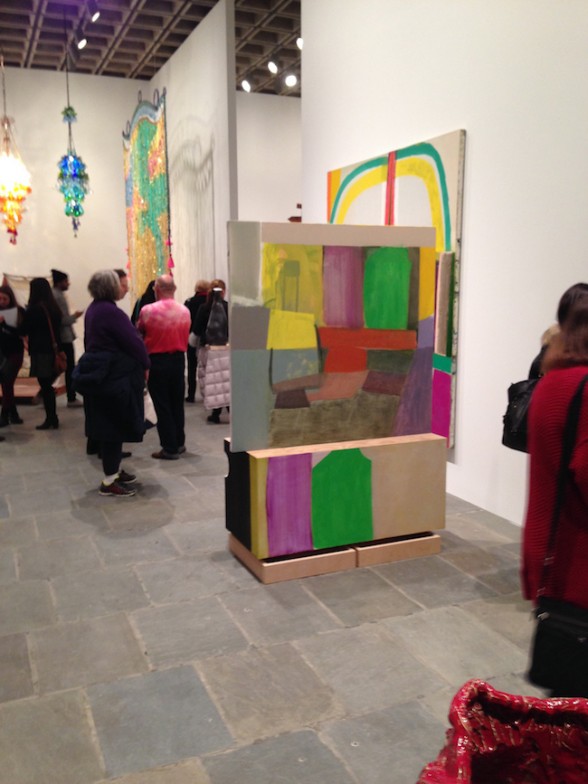
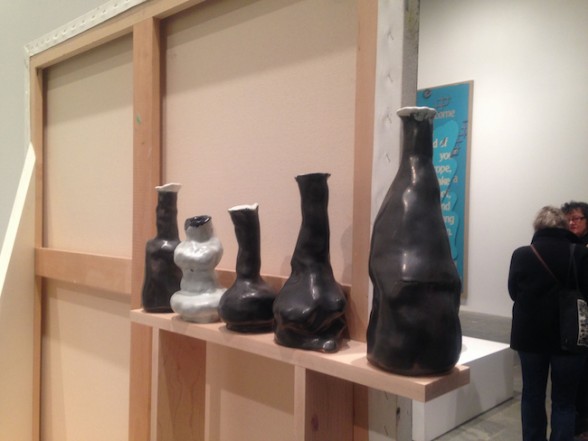
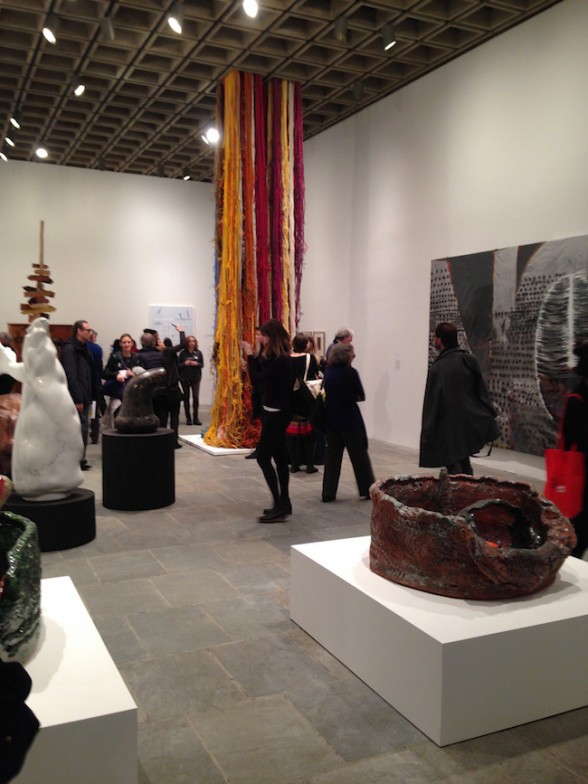
On the other side of the camera obscura, like falling into Oz from Kansas, we found a raucous, colorful, crowded space with a group of works that made a coherent thought about art as a lusty, risky profession not for the faint-hearted. Notable practitioners in this space include: Dona Nelson, whose excellent double-sided and stitched paintings are placed beautifully opposite Amy Sillman and Pam Lins (ceramics); Sterling Ruby, who just about steals the show with his death- and viscera-evoking ceramic “ashtrays;” David Robbins, whose outdoor writing desk and videos of performances tickled us; and Sheila Hicks with her color-filled fiber “un-rainbow” that cascades like a waterfall from the ceiling.
Third Floor – Curator Stuart Comer
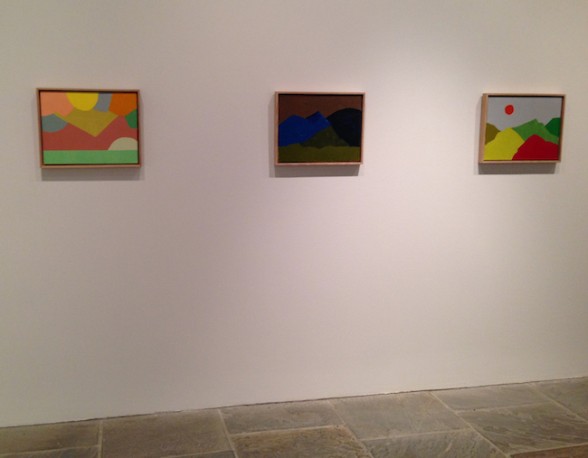
The fourth floor seems to take hours to get through. But the third floor, which is also a jumble, is less packed.
We liked:
- Etel Adnan – her woven, oil-barrel critique is both modernist design and smartly political.
- Miljohn Ruperto – his bunny/birdie animation “Janus,” 2014, kept us at attention. Is the animal dying? Or sleeping?
- Miljohn Ruperto and Ulrik Heltoft’s Voynich Botanical Studies, which start out as animations and wind up as gelatin silver prints are a lot of process with a point. Victorian and lovely and completely faux.
- Jacolby Satterwhite – Trippy, HD digital 3D animation video, “Reifying Desire 6 – Island of Desire,” 2014.
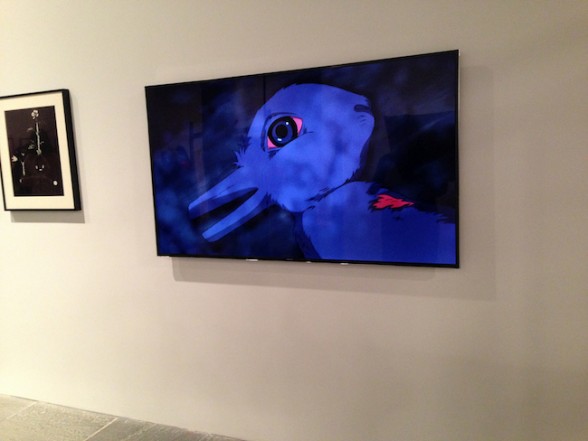
Second Floor – Curator Anthony Elms
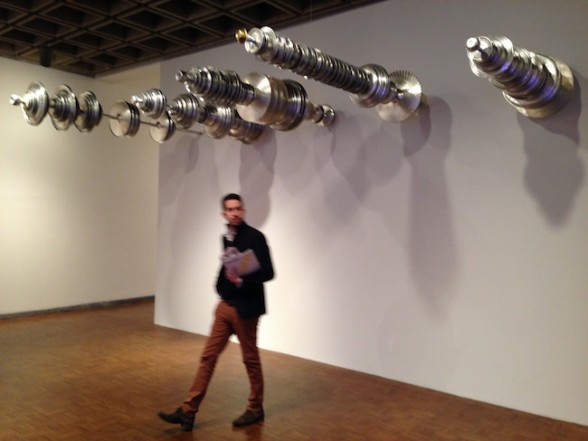
This is not a “war year” show with politics in evidence (there is some gender politics), but many of the works feel tight and depressed. On the second floor, notable for a relatively spare aesthetic, Terry Adkins‘ “Aviarium,” 2014, is a big “gun” that lends some needed chutzpah to the show. The artist, who died recently and unexpectedly at age 60, made this piece in 2014, perhaps the last work he made. Such a loss.
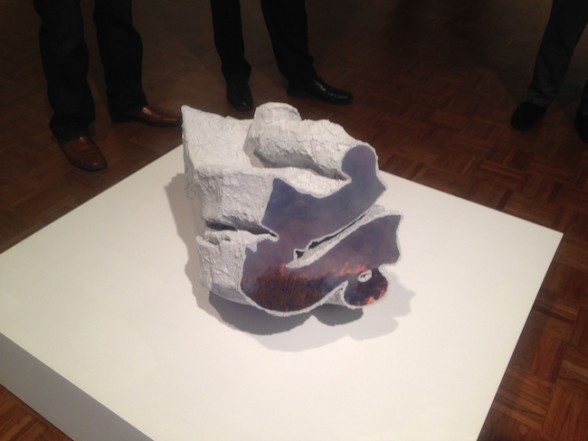
Other favorites on this floor include:
- Carol Jackson‘s four, modest-scale sculpto-photographs, whose visceral twists and turns remind us slightly of Vincent Fecteau’s ceramic “energy bombs” at the 2012 Whitney Biennial.
- Charline von Heyl – grid of 36 black and white mixed media print and collage pieces seemed tribal and mask-like.
- Steve Reinke and Jessie Mott – We love the animals and the child-like animation in the Bible-esque video,“Rib Gets in the Way…” although at 53 minutes long we missed a good portion of it and can’t really say what the point is.
Appearing elsewhere in the museum but curated in by Elms, we like:
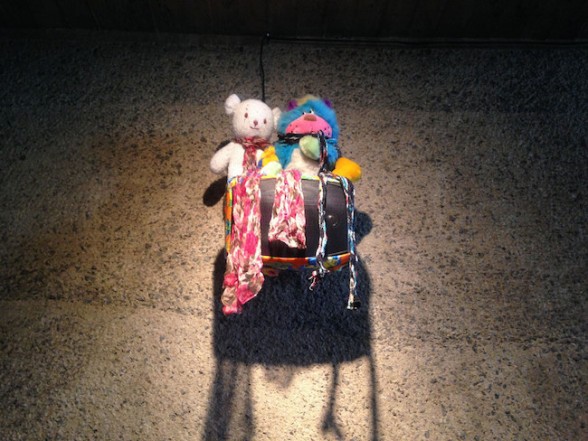
- Charlemagne Palestine – Mike-Kelly-like piece with small gangs of stuffed animals sitting high on the walls in the stairwell. Ominous music surrounds them and reminds us how seductive and repulsive stuffed animals are.
- taisha paggett – We saw her drawing performance at Vox Populi a few years back in a Vox juried group show.
- Zoe Leonard camera obscura we mentioned above.
Catalog
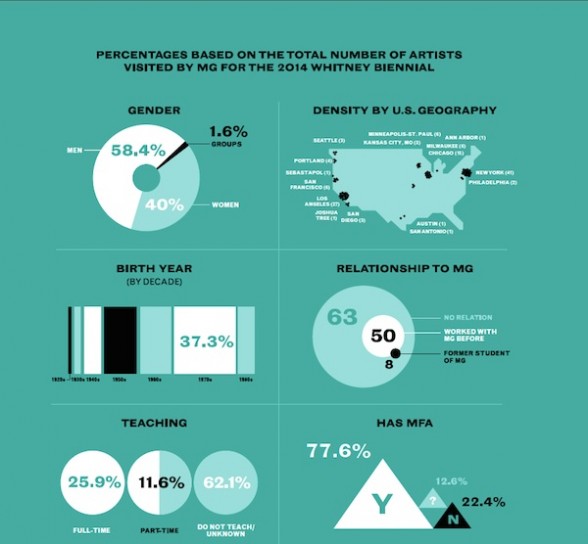
As usual, the catalog is worth having. There’s lots of Q&A material, with artists interviewing or talking with each other, such as: Louise Fishman talks with Dona Nelson; Ken Lum speaks with Alexander Alberro; Joshua Mosley talks with Paul Chan and Robert Fahey.
The preponderance of the written word and archiving in glass vitrines and in works on the walls is a persistent theme in the show–too dusty and depressing. After a while it beat us down. This is a show that needs editing. Look for the gems.
Whitney Biennial 2014, to May 25, 2014. Whitney Museum of Art, 945 Madison Ave at 75th St., New York 10021.


